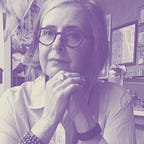Do I really know what it’s like?
In a grocery store lineup one day, I asked myself a big question.
As I clutched my bag of brussels sprouts and a bottle of house red I pondered, what if I was black, Indigenous, south Asian, or Asian, what would my experience be like in this exact scenario? Would I feel — truly— that I could stand straight and tall and meet the eyes of anyone who walked by? Would I feel any worry about someone making a derrogatory comment under their breath, or worse? Might people avoid making eye contact with me because of their perception that they saw me as the other —as less than, or a threat?
I have buckets of privilege. Loaded word I know, I know. White people often express discomfort and outright denial when faced with the label. My privilege doesn’t mean I’m wealthy. But I have a comfortable life, a graduate degree and I’m healthy and able to work. I’m 65, and I’m still alive. I enjoy freedom to move about and do pretty much anything anywhere without anyone asking me questions. I “belong” just because I am white.
Isabel Wilkerson, in her groundbreaking book, Caste: The Origins of our Discontents, observes that all of these things have to do with what is called class (as in upper-class, lower-class). She says that one can move from one class to another through education, occupation income, even manners. George Aye of Greater Good Studio stood in the middle of the stage at Cusp Conference in Chicago in 2018, and explained that fact that he was clearly Asian was virtually offset by his English accent. A proper English accent adds privelege and can counter some of the “otherness” of skin colour.
In explaining Caste, Wilkerson says that just like the cast a doctor puts on a broken limb, caste is fixed and immobile. If you are born into a lower caste, you are there permanently. If you are black, you are black for life, with all that the state of being black brings upon you. Your skin colour is your “red letter”. Four hundred years ago, North America began trading in human beings for the purpose of slave labour. It was the economic engine that drove the nation. That trade introduced the concept of colour. Before that time, human beings were human beings.
I’m white. I hate that term. It was born to a Ukrainian father and Irish American mother. I’m proud of my ethnic heritage, but it comes with a little bit of hurt, too. “White people” includes the English students who persecuted my father and his brothers for their accents in school. The kids that did the same to me because of my name were white, too. But, boo hoo. I can stand in a grocery store lineup and know, I have nothing to fear.
I’m fairly certain that no peace officer will haul me out of my car at a traffic stop. It wouldn’t even cross my mind. I didn’t have to coach my kids how to deal with police interactions. I’m not followed around a store to make sure I’m not shoplifting. I know that every Indigenous person, every person of colour does have to think about those things. And they experience them. That, my dears, is systemic racism. It’s not right. It’s not fair. It’s absolutely outrageous. And it most definitely alive and well in modern society.
